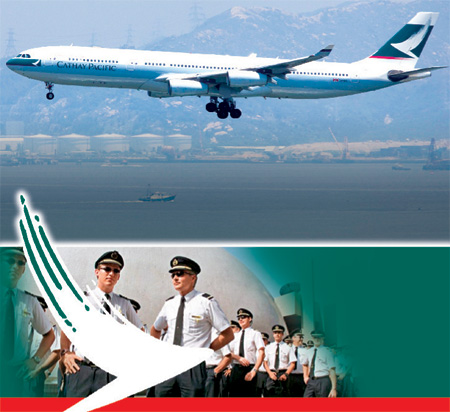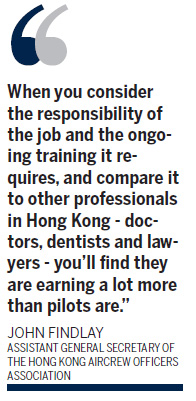Ghosts of 2001 haunt pilots' pay fight
Updated: 2010-11-03 07:10
By Simon Parry(HK Edition)
|
|||||||

Pilots vote this week on whether to threaten a work-to-rule at Hong Kong's biggest airline. With the history of bitter disputes and the mass sacking of the pilots known as the 49ers in 2001, the stakes could hardly be higher. Simon Parry reports.
As Cathay Pacific's pilots stand on the brink of their biggest showdown with management for almost a decade, there are two questions the airline is not yet prepared to answer: What effect will a work-to-rule have on passengers and how will the airline respond to the action?
In fairness, the questions are speculative for now as the 1,600 members of the Hong Kong Aircrew Officers Association (AOA) may decide in the coming days that imposing the threat of contract compliance is not the way forward in their long-running fight for higher pay.
But with the busy Christmas and Chinese New Year period looming and the memory still fresh of how Cathay Pacific responded the last time pilots used contract compliance as a weapon, those questions may quickly evolve into the dispute's central issues.
More than nine years on, the single seismic event that overshadows the deliberations of the AOA and its members this week is inevitably the mass sacking of a group of pilots later known as the 49ers in July 2001 to break a work-to-rule and sick-out campaign by pilots.
The brutal manoeuvre broke the pilots' resistance but led to a long and bitter campaign for reinstatement that split the pilot community and eventually resulted in multi-million dollar payouts to some of the sacked fliers in Hong Kong's High Court last year.

Could the same thing happen again? John Findlay, assistant general secretary of the AOA which is asking its members this week for the authority to announce contract compliance when it sees fit, insists history will not repeat itself.
"There is no fear, especially in the light of the worldwide adverse reaction to Cathay's actions and the recent High Court ruling in favor of the 49ers, that the company would take such disgraceful action again," he told China Daily.
However, documents circulated to AOA members and seen by this newspaper make it clear that the union is keenly aware of the 49ers legacy and has prepared for a campaign of contract compliance scrupulously to avoid any legal loopholes the airline might exploit.
While the 2001 dispute between Cathay Pacific and its pilots revolved around a complex set of issues regarding pay, rosters and rankings, the current dispute is simpler in nature and focussed mostly on one key issue: Salaries.
Although they are often regarded as being among the world's highest-paid cockpit crew, the AOA says the reality is that in recent years, the salaries of Cathay Pacific pilots have fallen behind those of their counterparts in other airlines.
Currently, pilots on the common B-scale pay stem earn between HK$33,179 a month for a newly-recruited second officer to HK$144,000 for a captain with 19 years' service. Captains start on HK$101,000 a month.
Expatriate pilots, who make up around 46 percent of Hong Kong-based pilots, also receive housing allowances ranging from HK$24,000 to around HK$60,000 and have 75 percent of their children's overseas schooling costs paid.
In talks that date back to 2007, the AOA is calling for pay rises averaging 30 percent over a four-year period, from January 2010 until 2013. The demand includes "catch-up" pay to bring them in line with salaries paid on comparable world-class airlines.
The AOA points out that pilots have had only one small pay rise - in 2008 - since 2002 and says a detailed study it did on salaries on other international airlines, the results of which were given to management more than two years ago, supports their case for the pay hikes.
Talk of 30 percent pay rises might seem outlandish at a time of global pay cuts and austerity but Findlay insists it is a fair award in the light of Cathay Pacific's "massive" profits and the effective freezing of pilots' pay for most of the past decade.
"When you consider the responsibility of the job and the ongoing training it requires, and compare it to other professionals in Hong Kong - doctors, dentists and lawyers - you'll find they are earning a lot more than pilots are," he said.
Goodwill has been a one-way street in Cathay Pacific in recent years, the AOA claims, with pilots agreeing to take unpaid leave during the global economic slowdown and being continually called up to work on their "G days" - guaranteed days off - often while they are resting after long-haul stints.
Despite such gestures, the airline has, according to the union, repeatedly stalled on the issue of pay rises even after it has returned to making what the AOA refers to as "enormous profits". The airline reported net income of HK$6.84 billion for the first half of 2010, up from 812 million dollars during the same period in 2009.
"The essential problem is the degree of frustration felt by pilots that the company puts no great effort into concluding any (pay) negotiations," Findlay said. "They seem to be quite happy to let it roll over and over and over without coming to a conclusion, and every year that goes by is another year where the company has saved itself money by not paying its pilots properly.
"The message pilots want to give to Cathay Pacific (through the vote on contract compliance) is to take the discussions seriously and devote more resources to it and show the pilots that things are indeed happening.
"There is a feeling at the back of people's minds that the company is being complacent and thinking that everyone is happy. But people are not happy. It's not just a pilot problem either. I think it is fair to say the problem extends to cabin attendants and even to some ground staff."
The AOA is from this week polling its membership - which accounts for the majority of Cathay Pacific's 2,500 pilots - to ask them to support a motion allowing the union to declare a work-to-rule at any time it sees fit during the ongoing pay talks with the airline.
Ahead of the voting starting this week, it issued detailed circulars to members describing how contract compliance worked and assuring them - with the trauma of the 2001 sackings clearly in mind - how pilots are within their legal rights to impose a work-to-rule. "Your goodwill is yours to give or to withhold," the union told its members.
The circular reminds members of the words of High Court judge Justice Reyes who, in his ruling on the 49ers case last year, said: "On contract compliance, those plaintiffs who voted in favor of the campaign did so because that was what they believed they were supposed to do in any case, namely, comply with their contracts.
"A desire to abide by the terms of one's contract can by no stretch of the imagination be treated as equivalent to an anti-company attitude."
In a call for support to members, AOA president Captain Peter Vinna said in another circular: "The last two years have left us at a watershed. We have weathered the worst economic downturn in recent history and have just begun to see the good times return.
"We are currently in negotiations on a wide range of issues, not the least of which is a well-overdue pay increase. Some of our expectations in this regard are that we will receive a justified payback for the concessions we made during the downturn, and some are seen to redress the wage deterioration we have experienced over the past several years.
"When these expectations are continually ignored and go unmet we are then left with little choice but to resort to whatever means are available to assist us in achieving our goal."
While the AOA says it cannot foresee what the effect of contract compliance will be, it believes the impact could be greater today than in previous years because it says Cathay Pacific has recently relied so much on pilots' goodwill by asking them to work on G days.
It is not the pilots' intention to cause flight delays and cancellations at one of the busiest time of year, Findlay insisted, but he added: "If that were the result, it wouldn't be the pilots' fault."
Cathay Pacific declined to discuss the pilots' intended actions in detail, limiting itself to commenting only on the motion put forward for support for contact compliance at a time of the AOA's choosing. It did not comment on the pilots' pay claim either.
However, in a statement that hints a forthcoming profit share payout along with 13th month bonuses may be affected by any pilot action, a spokeswoman said: "We are disappointed that the AOA feels it is timely or appropriate to bring forward such a motion which only raises undue anxiety levels among our crew ...
"We understand that the recommended motion has only been brought to forestall further, more aggressive motions that may otherwise eventuate. The company is expecting to make a record profit this year, some of which will be shared with all eligible staff in the form of 13th month discretionary bonuses and a further payment of profit share."
With the lessons of the 49ers learned, the AOA believes its moves towards contract compliance are legally watertight and will not put pilots' jobs at risk. "Voting for and complying with your contract is not illegal, industrial or anti-company," it has told members in one of its briefing papers. "It is precisely what you are supposed to do.
A "yes" vote from pilots in the days ahead will quickly determine whether - nine years after the mass sackings that triggered an epic legal battle - Cathay Pacific's executives will see the action in a similar light.
(HK Edition 11/03/2010 page4)